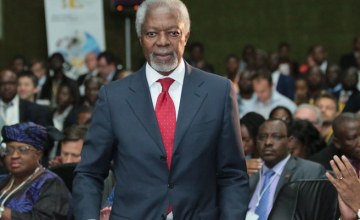Africa needs to step up investments in skills development and promotion of entrepreneurship to create jobs for young people, African leaders and businesses executives have reaffirmed.
Available data shows that although between 10 and 12 million young Africans enter the workforce each year, only three million formal jobs are created annually.
Besides, the youth often lack the skills required by employers, despite gains in education access over the past several decades.
"We need a sense of urgency in tackling the issue of unemployment. I cannot emphasize it enough," said Akinwumi Adesina, President, African Development Bank, during a high level panel on Jobs for African Youth at the ongoing Annual Meetings of the African Development Bank on Tuesday, May 24, 2016, in Lusaka, Zambia.
Adesina underscored the need to invest in skills development to facilitate job creation.
"It's not going to be about degrees – those are labels – it's going to be skills,” he said.
Adesina pointed out that the Bank has taken bold steps to turn Africa's phenomenal youth bulge into an economic dividend by developing a strategy that would create 25 million jobs for youth on the continent as well as equip an additional 50 million in the next decade.
The Bank Group's Strategy for Jobs for Youth in Africa 2016-2025, approved by the Boards on Wednesday, May 18, 2016 in Abidjan, encapsulates the institution's High 5 priorities, especially the fifth priority which aims to improve the conditions of living of Africans by turning the continent's surging population often described as a "time bomb" into an opportunity for inclusive growth.
The programs initially focus on the Bank's high-priority sectors of agriculture, industry, and ICT, will include an index to measure youth employment outcomes and enabling policies at the country level, and provide information on the evolution of labor market performance over time.
It can also be used as a tool to incentivize policy-makers to pursue agendas favourable to youth employment.
For his part, Carlos Lopes, the Executive Secretary of the UN Economic Commission for Africa (ECA), underscored the need for overhaul of educational policies in Africa.
Education reform in Africa, he argued, must be aligned to the economy and labour market needs.
He pointed out that if Africans migrating were properly tooled, they could help Africa's transformation, cautioning that migration will intensify as Africa grows.
For instance, 2.9 million people migrate out of Africa every year, but twice that number migrate out of China, Lopes said, illustrating the challenges posed by unemployment.
“We just need economic transformation and the issue of youth employment will be taken care of,” Lopes said.
For Africa, the gains of employment would be phenomenal. For instance, it would propel incomes, offer higher standards of living and better health and education access. It has been estimated that reducing Africa's youth unemployment rate to that of adults would translate to a 10 per cent to a 20 per cent increase in the continent's GDP.
Besides, it would provide better opportunities to thousands of youths who join rebel armies as well as save many souls who would otherwise perish in the Mediterranean Sea and the Sahara Desert in search of economic opportunity in Europe.
The need to invest strategically in the continent’s young people is a pressing growth issue, said Tony O. Elumelu, Founder, The Tony Elumelu Foundation, Nigeria.
Building entrepreneurship and the skills base would lead inevitably to inclusive growth, he said.
"The way to address jobs for the youth is to look for solutions within [the continent] and then to work together,” said Elumelu who is currently investing US $100 million in an entrepreneurship program to grow 10,000 African entrepreneurs and create 1 million jobs across Africa over the next decade.
AfDB’s Jobs for Youth in Africa Strategy will also provide technical and financial support to African countries that would enable them to pursue policies and plans which contribute to better youth employment outcomes by building institutional capacity and positioning the countries to increase their employment effects throughout the next decade.
The innovation component would enable the Bank to work with partners to incubate, implement, assess, and scale promising solutions.
"Youth unemployment is a matter of national security for everyone,” said Thomas Silberhorn, Parliamentary State Secretary to the Federal Minister for Economic Cooperation and Development in Germany.
The Bank’s Jobs for Youth in Africa Strategy is anchored in the Bank's overall vision of improving the quality of life for all Africans. The desired long-term outcome is expanded economic opportunity for both male and female African youth, which leads to improvements in other aspects of their lives.



